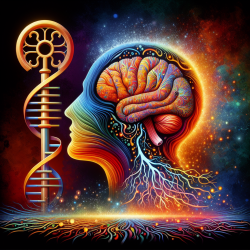Introduction
In the realm of speech language pathology and neurology, understanding the genetic underpinnings of disorders can significantly enhance therapeutic outcomes. The research article titled "EIF2AK2 Missense Variants Associated with Early Onset Generalized Dystonia" offers profound insights into the genetic causes of dystonia, a movement disorder that can severely impact communication abilities. This blog aims to distill the key findings of this research to help practitioners improve their skills and encourage further exploration into genetic influences on neurological disorders.
Key Findings from the Research
The study identifies specific missense variants in the EIF2AK2 gene that are associated with early onset generalized dystonia. These variants were found in a Taiwanese family and two unrelated Caucasian patients. The research highlights:
- The identification of a heterozygous variant, c.388G>A, p.Gly130Arg, in the EIF2AK2 gene linked to dystonia.
- Additional neurological manifestations in some patients, including intellectual disability and spasticity.
- Abnormal activation of the cellular stress response in patients with EIF2AK2 variants, as evidenced by enhanced PKR-mediated phosphorylation of eIF2α.
These findings underscore the role of the eIF2α pathway in the pathogenesis of dystonia, offering a potential target for therapeutic intervention.
Implications for Practitioners
For speech language pathologists and neurologists, these findings emphasize the importance of considering genetic factors in the diagnosis and treatment of dystonia. Practitioners should:
- Stay informed about genetic research related to neurological disorders to enhance diagnostic accuracy.
- Consider genetic testing for patients with unexplained dystonia to identify potential EIF2AK2 variants.
- Collaborate with geneticists to interpret test results and integrate genetic insights into treatment plans.
Encouraging Further Research
The study opens several avenues for future research. Practitioners and researchers should consider exploring:
- The broader implications of EIF2AK2 variants on other neurological and communication disorders.
- The potential for developing targeted therapies that address the dysfunctional eIF2α pathway.
- The role of other genetic factors that may interact with EIF2AK2 variants to influence dystonia severity and presentation.
Conclusion
Understanding the genetic basis of disorders like dystonia can transform therapeutic approaches and improve outcomes for patients. By integrating the insights from the EIF2AK2 research, practitioners can enhance their diagnostic and treatment strategies, ultimately leading to better patient care.
To read the original research paper, please follow this link: EIF2AK2 Missense Variants Associated with Early Onset Generalized Dystonia.










